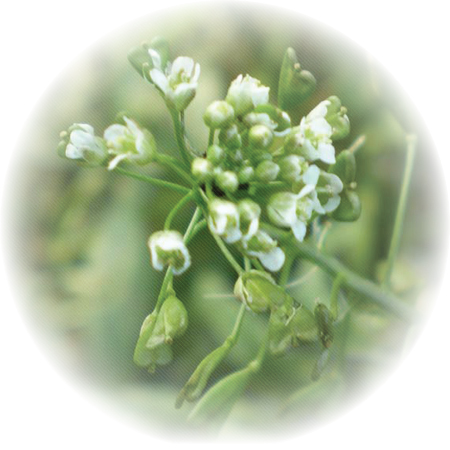Shepherd’s Purse, Cut & Sifted (Capsella bursa pastoris) – Dried Herb, Organic
$9.22 – $92.20
Shepherd’s Purse is also known as Witch’s Pouches, Mother’s Heart, Shepherd’s Pouch, Rattle Pouches, Shovel Weed, Pepper-and-Salt, Lady’s Purse. The genus means “little box” and the species name means “purse of the shepherd”. Shepherd’s Purse is native to Europe and the Western Asia and has been naturalized all over the world and is considered a common weed where it has been naturalized.
As a herbaceous annual or biennial, Shepherd’s Purse germinates in both fall and spring if the seeds receive light. This weed can grow in many different conditions and soil. It thrives in moist, fertile soils or dry, sandy areas in lawns, barnyards, roadsides and waste areas.
Shepherd’s Purse is recognized by its triangular, flat, purse-like fruits. There are 10-12 seeds per capsule and a single plant can produce up to 38,500 seeds. A seed can remain viable and dormant in the soil for up to 20 years. Shepherd’s Purse is in the mustard family which includes other herbs like Watercress, Maca and Turnip. Shepherd’s purse has been used for thousands of years and was well known for its properties in ancient Greece, Rome and was still commonly used in the middle ages. The seeds were found in the excavation of Catal Huyuk, a neolithic settlement in what is now Turkey.
The seeds have a peppery taste and were added to foods as a spice and roasted and ground into a meal for baking a Native American bread called pinole. Some colonists in North America cultivated the plant and sold the young leaves as spring greens.
Indigenous people in North America used Shepherd’s Purse as medicine for diarrhea, dysentery, stomach cramps and worms.
A fresh decoction or tincture was a remedy for blood in the urine (Ellingwood), heamorrhoids, and nose bleeds. For nose bleeds a piece of flannel was soaked in an infusion of the plant and inserted into the nostril. It was Dr. Johann Gottfried Rademacher who discovered the use of Shepherd’s Purse for kidney stones.
Shepherd’s Purse was most often used for the uterus in cases of excessive menstruation and in cases of dark, old, clotting flow most likely due to its high amounts of vitamin K. It was sometimes paired with Yarrow for their common properties in normalizing circulation to the uterus and moving blood to the extremities.
Midwives have used Shepherd’s Purse for centuries to stimulate uterine contractions during active labour; and as an aid in expelling the placenta and tonifying the uterus to bring it back to its regular size post-partum. In magick, the herb was used as a protective charm (not ingested) for pregnant mothers.
Shepherd’s Purse was used as a poultice, applied to rheumatic joints, bruises, strains and wounds. Culpeper stated: “The juice dropped into the ears, help with tinnitus.”
In Russian folk medicine Shepherd’s Purse was used for gastrointestinal issues such as diarrhea, gastritis, gallbladder and liver issues, as well as for lung problems.
Properties:
The taste and energetics of Shepherd’s Purse is pungent, salty, slightly diffusive, warm/cool and dry. Shepherd’s Purse has an affinity to the heart, circulatory system, skin, musculoskeletal system, uterus, kidneys, liver, gallbladder and digestive system. To balance a menstrual cycle with excessive bleeding combine Shepherd’s Purse with Yarrow, Lady’s Mantle or Raspberry Leaf. For varicose veins combine Shepherd’s Purse with Gotu Kola, Bilberry Leaf or Butcher’s Broom.
How to use:
1 teaspoon of Shepherd’s Purse to one cup of boiling water. Simmer for 15 minutes, strain and drink up to three cups a day. Use as a fomentation or make into a tincture.
Cautions & contraindications:
Not for children under 2 years old. Use under supervision with acute kidney inflammation or high blood pressure. May cause heart palpitations in large doses; and may cause drowsiness, changes in blood pressure or changes in thyroid function.
This information is for educational purposes only and is not intended to diagnose, treat or cure any disease or illness. Please consult your healthcare provider prior to the use of this product if you are pregnant, nursing, taking medications or have a medical condition. Individual results may vary.


Reviews
There are no reviews yet.